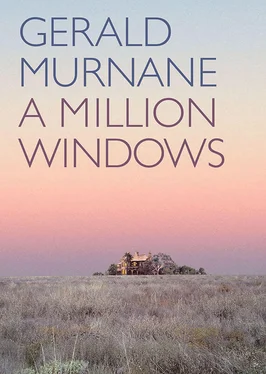Somewhere in both the first and the later edition of his book, the American scholar mentioned earlier uses the expression double-voicing to denote the technique by which the narrator of a work of fiction is able to seem to report a series of events while at the same time seeming to report the thoughts and feelings of some or another character involved in the events. The technique has been used by numerous narrators, but the undiscerning reader of this narrative may still be in need of an example.
Nick rubbed his eye. There was a big bump coming up. He would have a black eye, all right. It ached already. That son of a crutting brakeman.
The four sentences and the exclamation above are part of some or another work of fiction by Ernest Hemingway. A person reading the sentences with alertness should hear, as it were, two voices, one voice being that of the narrator and the other being that of the character Nick. In the first sentence, only the voice of the narrator can be heard. In the second, third, and fourth sentences, that same voice is heard again. In those three sentences, however, the voice of the narrator reports not only his own observations but sensations and insights of the character himself, and when these two are reported the language seems not only the narrator’s but partly that of the character. The discerning reader might even notice a gradual change in the viewpoint from sentence to sentence. The first sentence reports only what might be seen of the character. Later sentences move more closely, as it were, towards the character’s own viewpoint, and the final exclamation seems so much in keeping with the character that it might have been enclosed within quotation marks. By this time, the narrator who seemed, only moments earlier, to be addressing us in his own voice has seemed to fall silent.
I would estimate that rather more than half the fiction published during my lifetime is written from a point of view hardly different from that of the passage quoted above and seems to be told by a narrator claiming to know all that is known to the chief character but not much more. By this I mean that if the narrator were reporting the visit of the chief character to a certain hotel, he or she (the narrator) would not usually inform the reader that the hotel had been the site, a hundred years before, of the founding of a certain political party or of a notorious murder if the chief character was unaware of such matters. Not only have I read much fiction of the sort quoted but I have myself sometimes written such fiction and not wanted afterwards to repudiate it. This sort of fiction provides its readers with an experience not unlike what I felt when I stood confused among the concentric box hedges and gravel paths. I was not lost or in any sort of danger. Even if I had not been able to plot a path outwards through the hedges, I could have scrambled over them or through them and could have got back to my room whenever I chose. For as long as I limited my thinking, however; for as long as I observed what I supposed were the conventions of gardens and their designers; for as long as I felt bound to walk only on designated pathways and forbidden from breaking through even a miniature hedge, then I seemed truly a captive of the artifice and of whoever had designed it, even though I could look away at any time from the petty labyrinth and outwards towards the far-reaching countryside or upwards towards this massive building and its numerous windows.
I have not wanted to repudiate any fiction of mine the narrator of which has the viewpoint described above, but I have wanted, for almost as long as I have been a writer of fiction, to secure for myself a vantage-point from which each of the events reported in a work of fiction such as this present work, and each of the personages mentioned in the work, might seem, at one and the same time, a unique and inimitable entity impossible to define or to classify but also a mere detail in an intricate scheme or design. I might have written instead of the previous sentence that I have for long wanted to call into being a fictional narrator by definition more knowledgeable and more trustworthy than a personage such as myself, the narrator of this present work.
I have been sometimes dissatisfied with the sort of narration in which the thoughts and feelings of the chief character alone are reported. (‘Nick rubbed his eye…’) I have sometimes felt concerned that such fiction diminishes the importance of the narrator. The undiscerning reader of such fiction might well suppose himself or herself merely to be witnessing one after another event, so to call it, in the life, so to call it, of the chief character in almost the way that the viewer of a film supposes himself or herself to be witnessing actuality, so to call it. And yet, this sort of fiction gives to its reader an experience far richer and more satisfying than is offered by the spurious sort of fiction that seems to lack a narrator.
Was it thirty or forty years ago when I first tried to read the only work that I have tried to read by a certain author from Latin America who was later awarded the Nobel Prize for Literature? I long ago forgot the title of the book that I once tried to read. I had first learned about the book when I read a most favourable review of it in The Times Literary Supplement . I had paid my bookseller of those days a sum that was for me substantial so that she could have a single copy of the book sent to me by sea from England. I began to read the book with much expectation but was puzzled and dissatisfied before I had read twenty pages.
I have confessed already in these pages to being an ignorant and gullible reader. Thirty or forty years ago, I was even more ignorant and more gullible. After I had read the first twenty pages of the acclaimed work of fiction and had got no satisfaction from them, I was inclined to blame myself and my lack of skill as a reader. Even so, I read closely again the pages that had failed to satisfy me and further pages still, looking into the text itself for a possible cause of my dissatisfaction. I suspect that I had not previously studied the narrative technique of any work of fiction. I would have been well aware of the presence of many a narrator while I read but unaware of his or her technique or of its being only one of many that might have been used. In spite of my ignorance, I was quick to recognise that the fiction of the celebrated Latin American lacked any sort of narrative presence. I would have been hesitant thirty or forty years ago to blame or condemn the famous author but I long since decided that the author of a text lacking a narrative presence is guilty of posturing or, more likely, of incompetence.
What I read on the first page of the book mentioned was a monologue, and an undistinguished monologue at that. Someone who might have been male or female and of any age — someone was responsible for an uninterrupted outpouring. No, the author of the text in front of my eyes had written a report intended to persuade me that I was privy to — what were they? — the thoughts, the mutterings, the memories, or the daydreams of an utterly unknown thinker, mutterer, rememberer, or daydreamer. (However ignorant and gullible I might have been at the time, I could never have supposed the monologue, as I call it, to be any sort of purported text, as though the author of the book in front of me was quoting from the writings of one or another of his characters, so to call them. Even the least-skilled of writers could have composed something more readable than the unvarying wordage in front of me.)
After I had read a certain number of densely printed pages, I came to a gap in the text. After the gap came another body of text hardly different from the first, and even the reader that I was at that time began to resent the lack of information provided. Was the second monologue to be attributed to the same young or old, male or female thinker or mutterer or rememberer or daydreamer who had been responsible for the first? Or, was I now reading the presumed thoughts or whatever of quite another personage? Even the reader that I was at the time could see that the rhythms and the grammar of the second monologue differed in no way from those of the first. Perhaps the gap in the text was intended to denote an interval of fictional time. (The previous sentence happens to be the culmination of a series of sentences illustrating once again the form of narration exemplified by the passage that I quoted earlier from Ernest Hemingway. Quite without meaning to do so, I, as narrator, composed the series in order to point up the situation of my chief character, in this case my younger self. My having done so should demonstrate the usefulness of this mode of narration and even, perhaps, what might be called its naturalness.)
Читать дальше









